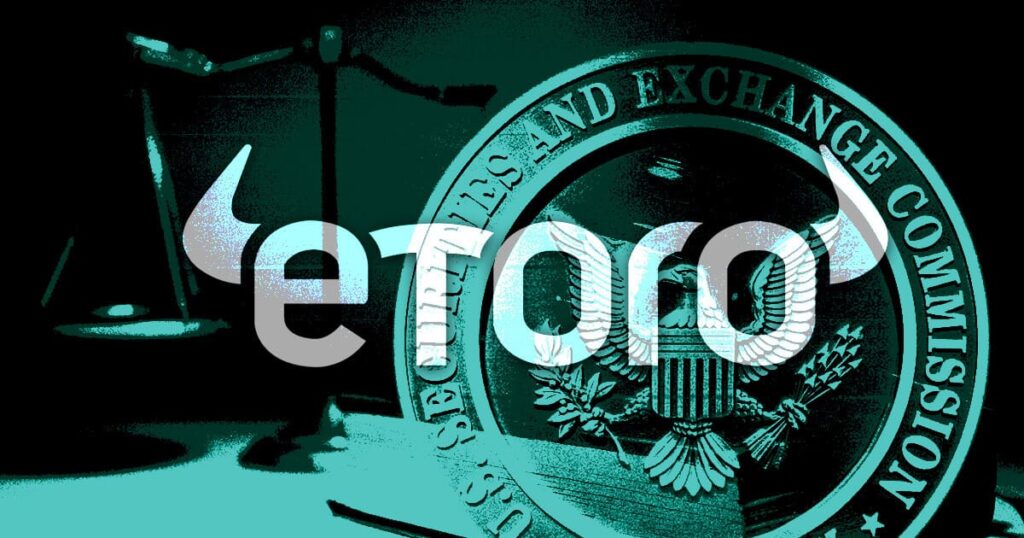eToro’s U.S. Crypto Trading Operations Affected by SEC Settlement; No Admission of Wrongdoing
Retail trading platform eToro has announced that it will cease offering nearly all cryptocurrencies to its customers in the United States, following a settlement with the U.S. Securities and Exchange Commission (SEC). The decision comes as part of an agreement designed to resolve the SEC’s allegations that eToro operated as an unregistered broker and clearing agency in relation to its cryptocurrency services. This move underscores the ongoing regulatory scrutiny faced by cryptocurrency platforms in the U.S., especially regarding their compliance with federal securities laws.
Settlement Details and Penalty
As part of the settlement, eToro will pay a penalty of $1.5 million (approximately ₹12.5 crore). The SEC’s investigation revealed that eToro allowed its U.S. customers to trade crypto assets that the regulator classified as securities without adhering to the necessary registration requirements. This non-compliance has been a critical focus for the SEC as it seeks to ensure that all trading platforms operate within the framework of U.S. securities laws.
Historical Context of the Allegations
The SEC’s allegations date back to at least 2020, highlighting a significant timeline during which eToro provided cryptocurrency trading services to its U.S. customers without proper registration. The commission emphasized that the nature of these digital assets qualified them as securities, and therefore, eToro was obligated to register as a broker-dealer and comply with federal regulations. The case against eToro illustrates the growing tension between cryptocurrency businesses and regulatory bodies as they navigate the complex landscape of digital asset regulation.
Impact on U.S. Customers
The ramifications of this settlement will primarily affect eToro’s U.S. users, who will soon find themselves with limited options for trading cryptocurrencies on the platform. While eToro will continue to operate in other markets, the withdrawal of most crypto offerings in the U.S. signals a broader trend in the industry, where platforms are reevaluating their compliance strategies in response to increased regulatory scrutiny. Customers may need to seek alternative platforms that comply with existing regulations to continue trading cryptocurrencies.
Broader Regulatory Landscape
The SEC’s action against eToro is part of a wider crackdown on cryptocurrency exchanges and trading platforms that have been operating without proper registration. As the regulatory environment continues to evolve, companies in the crypto space are under pressure to adjust their operations and align with the SEC’s requirements. This trend highlights the importance of regulatory compliance for maintaining legitimacy and fostering investor confidence in the cryptocurrency market.
eToro’s Position Moving Forward
In light of this settlement, eToro is likely to focus on enhancing its compliance protocols and possibly reevaluating its offerings in the cryptocurrency space. While the platform remains committed to providing a variety of trading options for its users, the shift away from cryptocurrencies in the U.S. market may prompt eToro to explore other asset classes or investment opportunities. The company has not admitted to any wrongdoing in the settlement, which allows it to maintain its operational focus while navigating the regulatory landscape.
Conclusion: A Cautionary Tale for Crypto Platforms
The settlement between eToro and the SEC serves as a cautionary tale for cryptocurrency platforms operating in the U.S. It underscores the necessity for robust compliance measures and highlights the consequences of failing to meet regulatory standards. As the cryptocurrency industry matures, platforms will need to adopt transparent practices and prioritize compliance to avoid similar legal challenges. The future of cryptocurrency trading in the U.S. remains uncertain, but the eToro case illustrates the significant impact that regulatory decisions can have on the industry’s landscape.


















